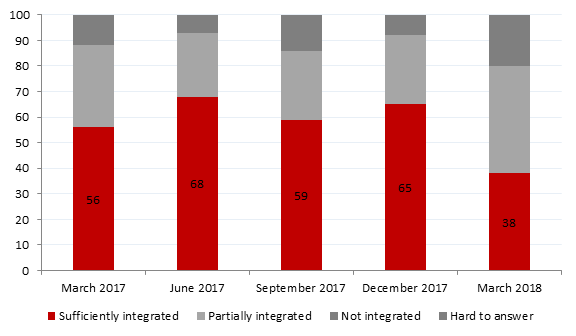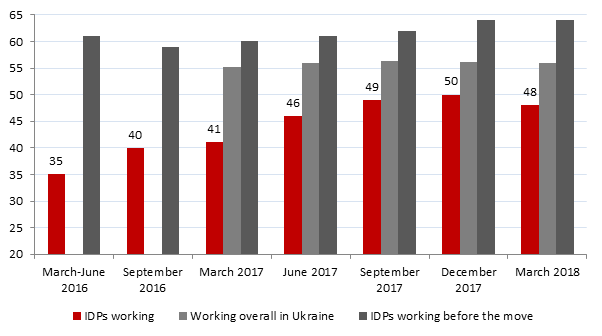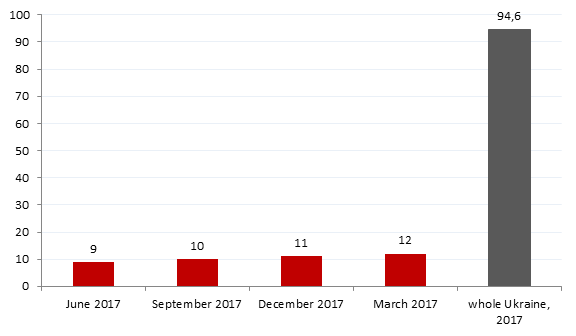What do we mean by integration?
In general understanding International Organization for Migration defines integration as the mutual adaptation between the host community and migrants both as the individuals and as the group. To evaluate the process of integration researchers analyze whether the behaviour of migrants is getting more like the behaviour of the local population in different spheres: language knowledge, wages, the probability to find a job, using social benefits, ownership of the house or rent of the house, how often they communicate with the neighbours, participation in election process. There is a lot of research in the countries with valid statistical information (Canada, USA, EU countries) that shows that it takes 5-10 years, depending on the country, for foreign migrants to integrate into the local communities.
This understanding of integration is in line with the expected outcome of the Strategy of integration of internally displaced persons and implementation of the long term solutions for the internal movement until 2020. Internally displaced persons will no longer need specific help and will be able to exercise their rights the same as other citizens.
Why is integration important?
According to the data from the research of the last four years, IDPs feel difficulties with integration to their new communities. Although there is a lack of some data that Organization for Economic Co-operation and Development advises to collect, the researches that were conducted show the lack of IDPs’ access to basic rights. The data shows that the integration of the IDPs is getting better, they did find jobs, rented the accommodations, they get educational and medical services, although still to the lesser extent than the local population. However, they still are mostly not included in communities’ decision making processes and to exercise their basic rights have to deal with administrative issues and are used to relying mostly on themselves and humanitarian organizations, rather than on the state.
Internally displaced persons need help with integration to host communities. It is particularly important during the armed conflict and economical crisis, when the level of intolerance is on the rise and newcomers become the “first to blame”. This situation is turning them into the marginalized group, who are excluded from the life of the community and who are the irritant and the reason for the increased social tension. Moreover, integration gives them the opportunity to realize their economic, social, political and cultural potential.
The successful outcome of this process depends not only on IDPs but also on the host community, including local population, local authorities and civil society. It is the institutions, such as educational facilities or the departments of social protection that provide “the rules of the game”. Regulatory acts, structure, the knowledge and skills of the employees are all parts of these institutions and they affect the success of the IDPs integration into the host communities.
As integration is a two-way process, which needs according steps both from IDPs and from the local authorities and communities, the implemented policies concerning IDPs are the measure not only of how easy it will be for them to integrate but also of the openness of the community to take in migrants and to see them as a part of the community.
Why are we still talking about the need to integrate IDPs?
According to the research of the International Organization for Migration, only about half of the IDPs consider themselves integrated into the local communities.
IDPs’ subjective evaluation of their integration

Source: Reports of the national system of monitoring situation with internally displaced persons, IOM.
Access to the labour market for the IDPs is worse than for the rest of the Ukrainian population. One of the reasons for this is the important role that social contacts play during the job search, and developing such contacts in the new city takes time.
Access to labour market

Source: Reports of the national system of monitoring situation with internally displaced persons, IOM; State Statistics Service of Ukraine, authors’ calculations.
According to the data of IOM, the share of the IDPs who are working, increased over time and in March of 2018 it was 48%. However, it is still lower than the share of those working among the whole population of Ukraine (56%) and is significantly lower than the share of the IDPs who were working before they had to move (64%).
As for the living in the own houses or apartments and in the rented ones, the behaviour of the IDPs and the rest of the population differs radically. These differences occur because a large share of the housing in Ukraine is private property, and mostly people live in their own house or apartment, and not in the rented one.
Ownership of the housing

Source: Reports of the national system of monitoring situation with internally displaced persons, IOM; State Statistics Service of Ukraine.
Why the cities?
At least three fourth of the IDPs live in the cities. Their needs differ from the needs of the local population, first of all because they do not own any housing and thus have to spend more on rent, and also because of the lack of individual social contacts that are important factor in finding a job, especially in the cities with the underdeveloped informational systems for the career opportunities. On the other hand, municipalities are responsible for the infrastructure condition. And access to this infrastructure can make integration of IDPs easier. For example, developed system of preschool education facilities not only helps integrate the children, but also makes it easier for the parents to enter the labour market. At the same time, state financial system often does not allow to react to the increased number of population in the cities quickly enough and to provide the unobstructed access to the services and rights.
Support Cedos
During the war in Ukraine, we collect and analyse data on its impact on Ukrainian society, especially housing, education, social protection, and migration











